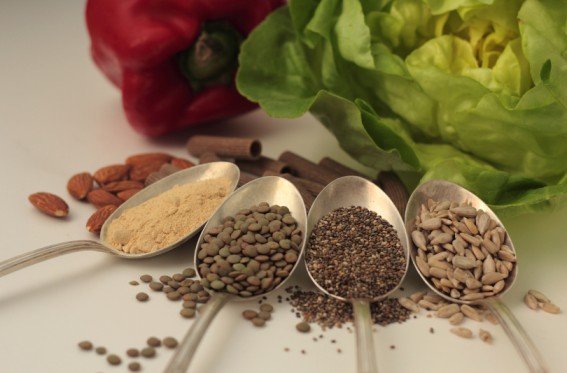What is Polycystic Ovary Syndrome (PCOS)

Polycystic Ovary Syndrome (PCOS) is a hormonal condition common among women of reproductive age, which can develop into a non-communicable metabolic disorder.
I often hear from women with PCOS who are striving between achieving a quality life and living with symptoms, and get frustrated and have lost all hope, because the only solution their doctors offer is to take a pill and live with their symptoms.
Although PCOS affects every woman differently, symptoms may include irregular or prolonged menses, elevated levels of testosterone hormone, acne, hair loss or frontal balding, facial hair growth, chronic lethargy or fatigue, insomnia, and enlarged multiple ovaries.
In response, there is proven research that says PCOS can be reversed and we successfully helped 100s of women achieve their goals.
So let’s see how to manage PCOS naturally with Nutrition:
Diet

The root cause of PCOS is insulin resistance and we should avoid foods that exacerbate insulin resistance and cause inflammation which will worsen your PCOS symptoms. Some foods have an effect, they slow down the digestive process and reduce sudden increases in blood sugar levels which helps in combating insulin resistance.
Best Foods for PCOS that provide plenty of nutrition:
- Complex Carbohydrates: Whole grains: such as brown rice, barley, sorghum, millet, and other whole grains can help people with PCOS avoid spikes in blood sugar.
- Non-starchy vegetables: such as leafy green, gourd family vegetables like bottle gourd, ridge gourd, ash gourd, tomatoes, turnips, mushrooms, bell peppers, onion, broccoli, pumpkin, cauliflower, cabbage, beans, etc.
- Whole fruit: The fiber content in whole fruit helps you feel full, helps your digestion, and slows down the absorption of its sugars into the bloodstream.
- High-fiber foods: Turnip, Broccoli, cauliflower, red and green peppers, almonds, sweet potatoes, and pumpkin are great examples of high-fiber foods.
- Lean proteins. Although they do not have much fiber, lean-protein foods such as chicken, fish, and egg whites keep you full longer and help stabilize your blood sugar.
- Anti-inflammatory foods. Inflammation is one of the underlying features of PCOS, anti-inflammatory-rich foods which include nuts, tomatoes, ginger, spinach, berries, turmeric, and fatty fish such as salmon and sardines help to reduce inflammation.
- Healthy Fats and Omega-3 rich fish, such as salmon, baked or broiled, Ghee, cold pressed coconut oil
Avoid these foods that can ramp up inflammation:
- Deep fried foods (Fritters, French fries, kebab, potato chips, and fried meat or chicken or fish).
- Refined and Processed snacks, bakery foods,: cakes, cookies, deets, candy doughnuts, and pies
- Processed cereal with sugars, including instant muesli, oatmeal, and granola bars.
- Sugary beverages such as sodas, milk teas, and canned and sports drinks
- Alcoholic beverages
- Refined flour, corn flour, white bread, maida-based rolls, pizza, and refined flour pasta.
Hydration

Stay hydrated as it is essential: Drinking plenty of water, buttermilk, and unsweetened beverages like coffee or tea.
PCOS: Take charge
Right Nutrition and healthy lifestyle habits, such as routine exercise, and managing stress with plenty of sleep can work wonders to cure PCOS symptoms, lowers the risk of developing metabolic disease, and improves the quality of life.
Click on the explore button below for more info on management and prevention of PCOS.
